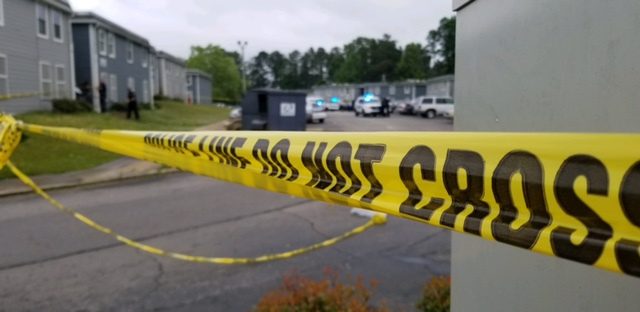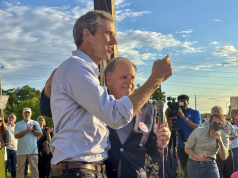
By Ryan Michaels
The Birmingham Times
More people were murdered in Birmingham in 2021 than in 2020.
With 132 homicides last year, the city came within just nine slayings of its all-time high record. The last time homicides reached into the 130s was in 1994.
Those numbers have caused concern for city councilors and residents alike.
“I feel like we’ve lost a generation. If you look at [many of] these kids today…look in their eyes there is no compassion,” said Simetta Hamby of Airport Highlands neighborhood. “They have nothing in their eyes. I think it’s fair to say that it’s a generation that is low on respect and ambition.”
Some of the homicides have been brazen. In December, two brothers were killed in a shooting outside of a gas station in east Birmingham. “It was in broad daylight that that incident happened,” said Carl Davis, President of Zion City Neighborhood Association. “They were only in their twenties… we are losing too many of our children.”
Birmingham City Councilor Carol Clarke said the increase in homicides is “sounding an alarm” that something is wrong with the society . . . “people are highly agitated . . . so how do you get to those root causes? I don’t know what that answer is.”
Councilor Valerie Abbott said the number of guns in people’s hands is dangerous “for in-the-moment violent crimes . . . If everyone wasn’t walking around with a gun in his pocket, that would certainly help with the crimes of passion,” she said.
Birmingham in 2021 had 10 more slayings than 2020′s total of 122, which was the highest number of killings in the city in 25 years — 121 homicides in 1995, according to AL.com.
“A National Problem”
Birmingham, however, is not alone with its increased number of homicides in the last year, some councilors pointed out. Cities across the country have been dealing with higher rates of murder and other crimes.
“It’s up everywhere,” said Councilor LaTonya Tate, “so this is a major problem across the nation, and you got people that are possessing illegal handguns, and this is a national problem.”
At least 12 major U.S. cities had broken annual homicide records in by the end of the first week in December, Portland, St. Paul, Tucson, Albuquerque, Louisville, Indianapolis, Austin, Baton Rouge, Columbus, Philadelphia, Toledo and Rochester, according to ABCNews.com.
“We have trended downward in all categories of crime except murder,’’ Birmingham Police Chief Patrick Smith told AL.com. “This is not a problem that rests solely on the police department to resolve, this is a community issue, a political issue, and a budgetary issue.”
Tate, who chairs the council’s public safety committee, said reducing homicides requires changing a different approach in the city and nation.
“We have to reimagine what it looks like to fully fund community safety, what it means to address structural, systemic challenges that communities are facing,” Tate said, “and we have to come to some type of common bond across the state of Alabama, where we realize healing is just essential for real, true justice, and stand together.”
In addition, Tate said “restorative justice” is one of a number of initiatives she would like to implement in Birmingham. Restorative justice is a process of bringing victims and perpetrators together, so that the “healing process can begin,” she said.
Violence Intervention
Throughout 2021, the city announced steps to curb violent crime. After the injuries and deaths of multiple children, Woodfin partnered with Crime Stoppers in June to offer a total of $125,000 to individuals who could provide information leading to arrests of violence against children. No money has been given out yet.
To address Birmingham’s gun violence, city councilors recently approved $2.1 million for a hospital-linked violence intervention program (HVIP), a partnership between the city, Jefferson County Department of Health (JCDH) and the University of Alabama at Birmingham (UAB) to provide a variety of social services to victims of gun violence while they are in the hospital.
In addition to money for the HVIP, there is an additional $900,000 for other community-based public safety initiatives.
Council President Pro Tempore Crystal Smitherman said the city is also currently putting together a program to teach conflict resolution program for children in Birmingham.
However, the city needs to “do more,” said Tate.
“When I say, ‘do more,’ that means that community leaders, people that live in these communities, are going to have to step up to the plate and do their part,” she said, “because we all have got to come together collectively and make this happen.”
Tate said the mayor and council can’t solely address the problem — “people in these neighborhoods… have to be involved,” she said.
Councilor Darrell O’Quinn agreed.
There are often people within communities that know about violence but often also don’t want to tell law enforcement, he said. “… there’s this code of silence in the community that prevents us, prevents law enforcement, or anybody else, from being able to intervene,” he said.
O’Quinn also said he is interested in investing more in a variety of other services to help reduce gun violence, like mental health services and violence interrupters, which are non-law enforcement professionals who enter communities to mediate conflicts and mentor people who are at “high-risk” for committing gun violence.
Councilor Clinton Woods urged residents to inform Birmingham police when they know about violence in the community because rarely is anything “happening that nobody knows about,” Woods said.
“When there’s an incident, if you [a resident] know something that’s going on, you’re aware of someone that’s shooting, killing people, that’s information that needs to be shared,” he said, “because if they are willing to shoot and kill one person, they’re probably willing to shoot and kill multiple people.”
Davis, President of Zion City Neighborhood Association, said some of the crimes can be prevented if police were more visible.
“There are [often] no police in the area or in our neighborhoods,” he said. “. . . They don’t patrol anymore, they not sitting out there where the speeders are, they aren’t anywhere. So, if I’m a criminal and I see no police I’m going to do what I want to do.”
In October, the city launched its Real Time Crime Center (RTCC), dedicated to promoting public safety and reducing crime through the police department remotely viewing cameras and GPS coordinates from other BPD members.
“I don’t believe that [Real Time Crime Center] will stop crime,” added Davis. “It may let you know when a crime happens, but we really need manpower. If you don’t have a policeman out there when an actual crime is being committed, all you’re saying is a crime was committed because by the time the police get there the criminal is long gone.”
Times staff writer Haley Wilson contributed to this post.




